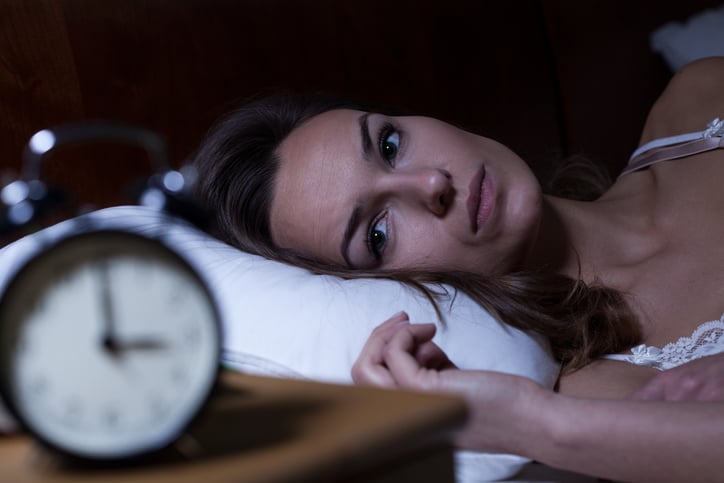Sleep Better with 10 Tips to Improve Your Sleep As You Age

Less restful sleep, waking up much earlier than normal, or falling asleep before the “early bird” specials or during an action-packed movie are common to many people—especially as they advance a bit in years. Yet despite contentions to the contrary, they are not inevitable or something you need to just learn to live with. On the contrary, you can sleep better throughout your life and you still need them to function properly and maintain optimal health.
When I was first asked to write this article about getting better sleep, I thought to myself, “I am the worst person to be writing about sleep since I can never manage to get any!” But, then, a funny thing happened, the more I looked into how easy it is to tweak a few things to sleep better, as well as the benefits of getting great sleep, specifically the weight-loss benefits associated with quality sleep, I suddenly became more interested in the subject!
I think you, too, will enjoy the information I found on hacking your sleep to get better quality, quantity, and restfulness as you age and how easily you can incorporate them into any lifestyle.
10 Tips to Sleep Better
Weight-Loss Benefits of Sleep
Before we get into the hows of improving your sleep, let’s briefly discuss the weight-loss benefits of getting great sleep.
Cravings—you can minimize both hunger and cravings when you are fully rested. Leptin and ghrelin are the hunger hormones, and they’re directly affected by the amount and quality of your sleep. So, the simple solution to less cravings is plenty of restful sleep.
Fat loss—according to the Annals of Internal Medicine, “those on a sleep-deprived diet experienced a 55% reduction in fat loss compared to their well-rested counterparts.”
In fact, researchers at the University of Chicago found that insulin sensitivity dropped by an outrageous 30% after just four days of shorted sleep. Sound like your typical work week? Here’s what they had to say:
Sleep Quality—It’s All About Your Hormones
Better sleep is about hormones? Yes, hormone regulation is one of the many factors involved in getting quality sleep. Melatonin is the body’s natural sleep remedy and is a hormone that helps regulate your body’s rhythm. You go through various sleep cycles during the night, ranging from deep sleep to light sleep, and melatonin can help you stay on a good sleep/wake cycle. Many folks even supplement with melatonin to help with many health factors, one of which may include falling asleep sooner and more easily.
We also have another hormone called cortisol which is a crucial player in the sleeping game. Associated with stress, elevated levels of cortisol can cause you to awaken during the night, disrupting what would otherwise be a peaceful sleep.
What’s worse, in a study found in the Journal of Clinical Endocrinology and Metabolism, scientists found when you get less than six hours of sleep a night, it engages an area of your brain that regulates your appetite. Lack of sleep increases your need for food while also depressing leptin (the fat-burning hormone) and stimulating ghrelin (the hormone which causes hunger). This can be a recipe for disaster when it comes to appetite control, cravings, and weight loss.
Address Medical Issues to Improve Sleep
You may suffer from any number of ailments that could impede your ability to experience a good and refreshing night’s sleep. Medical conditions like sleep apnea and restless leg syndrome are two well-known culprits when it comes to disrupting sleep.
Also, it seems that as you get older, you tend to have a few more medications in your daily repertoire than you used to. Some of these may hinder your ability to get a good night’s rest. Check labels or ask your doctor if there are any medications that might be preventing you from getting to sleep or staying asleep. You may be able to adjust your medications or change the times you take them to better suit your sleep schedule.
Choose Foods Wisely Before Bed
Conventional wisdom says not to consume extremely spicy meals in the few hours leading up to bedtime because they can rev up your system. In fact, eating heavy meals or meals that are hard to digest—a fatty steak dinner, for example—can lead to discomfort, heartburn, and possible gastric upset. Also, avoiding caffeine and even foods with caffeine (like chocolate) can help you relax and rest more easily than if you indulge too close to sleep time.
Minimize Fluids Close to Bedtime
Limit fluids prior to bed for what are probably somewhat obvious reasons. Common sense dictates that it’s not wise to consume large volumes of water or other liquids right before bed. Not only will this make it uncomfortable to lie down, but you’ll probably have to wake up to visit the restroom once or twice during the night, and chances are good that getting right back to sleep may be tough.
What to do instead to sleep better? Stay well hydrated throughout the day. Taper down your liquid intake as the evening approaches. And, keep a fresh glass of water by your bedside and have a few sips before dozing off.
To Nap or Not to Nap, that Is the Question
Should you nap? The answer is… it depends. Naps can be a double-edged sword. On the one hand, if you’re able to go to sleep easily and wake feeling rested, and it doesn’t appear to affect your nightly sleep patterns, then you get a thumbs up in regard to napping. It appears about 40% of the population are natural nappers.
But, if a nap leaves you groggy, you can’t fall asleep, or keeps you up for hours past your normal bedtime, then, sadly, naps may not be a good idea for you.
What are the general napping guidelines?
- Think “cat-naps” or power naps as in short periods of sleep—between 5 and 30 minutes is the ideal length of time for a beneficial nap. Twenty minutes is the most common recommendation. And according to recent research in Current Opinion in Pulmonary Medicine, “naps of less than 30 minutes promote wakefulness and enhance performance and learning ability.”
- Time of day matters—don’t hunker down too close to bedtime or your body may think it’s time to sleep for the night, and you’ll wake up dazed and groggy, or you’ll make it that much more difficult to get to sleep when the time comes.
- Assess yourself—do you feel energetic and more productive after a nap? Or do you feel worse than before you fell asleep? Dr. Sara Menick, associate professor of psychology at the University of California, Riverside, and author of Take a Nap! Change Your Life, explains that while “naps can be restorative for some people; other people wake up feeling like crap.”
- For people who are natural nappers, skipping naptime can kill productivity. For non-natural nappers, the nap can interfere with productivity. To assess your naptime needs, try sleeping for just 15 minutes and see if you wake up energized or foggy.
Develop a Routine
It’s important to develop bedtime ceremonies and regular routines. Your body likes to function on a schedule. If you can train yourself to get up at the same time each morning and go to bed at the same each night, you’re taking the first steps to sleep better.
Approximately one to two hours before you plan on hitting the sheets, start winding down. That means stop watching television and using blue screens like laptops, iPads, and cell phones. Enjoy subdued lighting and don’t engage in strenuous activities that could rev up your system. Make sure to eat your last meal of the day several hours prior to bedtime as well so you can fully digest your food before lying down.
Once you get your routine set, you’ll come to enjoy your winding down ceremonies and getting to sleep and enjoying quality rest will become part of your normal regimen.
Optimize Your Sleep Environment
Your sleeping conditions are also vital to the success and your ability to sleep better. Studies show your sleep quality improves if you do the following:
- Sleep in a dark room—that means minimizing lights, even those from alarm clocks and night lights. The darker your room, the better your sleep.
- Keep it quiet or not—this may take some experimentation. Some people sleep much better in silence. Others may sleep better with a white noise machine or other soothing sounds as they drift off.
- Opt for cold—sleeping in a cool room allows for better sleep since your body naturally cools down as you enter deeper sleep cycles. Giving yourself a head start by keeping the temp down can help you get to sleep faster. Ideally, your bedroom temperature should be 70 degrees or colder for an optimal sleeping environment.
Get Enough Exercise (at the Right Time)
Getting exercise on a regular basis will also help you sleep. It’s good to not only stretch, strengthen, and use your body through regular exercise, but it’s also helpful come bedtime. When you are able to wear yourself out with your exercise routine, you can get rid of the stress built up throughout the day, clear your mind, and enjoy the endorphins (happy hormones) that exercise creates.
That said, it’s best not to exercise immediately before bedtime. You need an hour or two just to wind down properly before hitting the sack, so make sure you hit the gym well in advance of your pre-set bedtime so your body has time to unwind and relax.
Limit Alcohol
Yes, we all know alcohol can make you sleepy, but that doesn’t mean it promotes quality sleep. In fact, quite the opposite. Consuming alcohol can have you waking up a few hours after you drift off to sleep, only to find that you can’t get back to sleep.
Relieve Stress
Yes, not surprisingly, stress relief is helpful when it comes to getting your ZZZs. If your mind is racing, it can be downright impossible to get to sleep. Clearing your mind prior to bed with meditation, reading, a relaxing bubble bath, subdued lighting, and quiet, stress-free activities are keys to better sleep. Again, keeping stress levels low will help keep the stress hormone, cortisol, in check which means better rest, overall.
Even if you aren’t keen on adding any of the above tips to your routine to sleep better, maybe, just maybe, you are interested in the benefits I mentioned at the beginning of this article. Getting better sleep isn’t something that’s going to happen by itself. Making the effort to change your lifestyle to take charge of your sleep quality is well worth it. Maybe just being aware of the huge benefits of improved sleep will help you do what it takes to improve your sleep.
The bottom line is, you don’t have to take sleep problems lying down! Take charge with the 10 tweaks to sleep better that I’ve shared, and you’ll have your sleep habits under control in no time!






